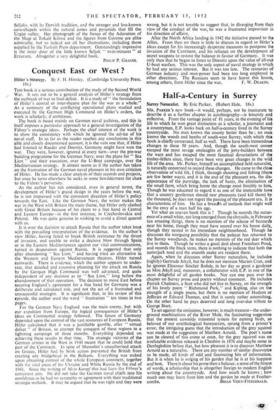Conquest East or West ?
THIS book is a serious contribution of the study of the Second World War. It sets out to be a general analysis of Hitler's strategy from the outbreak of war to final defeat. It is a study of " the formulation of Hitler's central or inter-theatre plan for the war as a whole." As a summary of the conflicting operational plans studied and executed by the German High Command on Hitler's orders, the work is scholarly, if ambitious.
The book is based mainly on German naval archives, and this in itself imposes a particular approach to a general investigation of the Fiihrer's strategic ideas. Perhaps the chief interest of the work is to show the consistency with which he ignored the advice of his naval staff. In so far as the reader reaches any conclusions in this able and closely documented account, it is the vain one that, if Hitler had listened to Raeder and Doenitz, Germany might have won the war. They were, however, ignored at every turn—over the pre-war building programme for the German Navy, over the plans for " Sea Lion " and their execution, over the U-Boat campaign, over the Mediterranean strategy. It almost seems as if the author has taken on the frustration of the German naval planners in his own criticism of Hitler. He has made a clear analysis of their records and projects, but once he turns elsewhere he seeks in some bewilderment for clues to the Fiihrer's perversity.
As the author has not considered, even in general terms, the development of Hitler's grand design in the years before the war, he is not impressed with the consistent direction of Hitler's policy towards the East. Like the German Navy, the writer makes the war in the West with Britain the main theme, but Hitler only clashed with Great Britain because of his claim to a free hand in Central and Eastern Europe—in the first instance, in Czechoslovakia and Poland. He was quite genuine in wishing to avoid a direct quarrel with us.
It is over the decision to attack Russia that the author takes issue with the prevailing interpretation of the evidence. In the author's view Hitler, having failed to break British resistance by the threat of invasion, and unable to strike a decisive blow through Spain or in the Eastern Mediterranean against our vital communications, turned in desperation against Russia. It is suggested that only after abandoning " Sea Lion," and having tried an alternative in the Western and Eastern Mediterranean theatres, Hitler turned eastwards. There is evidence, which the author appears to under- rate, that detailed and extensive planning for the attack on Russia by the Gerrpan High Command was well advanced, and quite independent of any decision as to Sea Lion," long before the abandonment of that operation. The decision to move Fast before securing England's agreement for a free hand for Germany was a deliberate and calculated risk, and not the act of a frustrated and unsuccessful strategist. It is significant that, in his review of this episode, the author used the word " frustration " ten times in two pages. For the German Navy England was the main enemy, but with our expulsion from Europe, the logical consequences of Hitler's ideas on Continental strategy followed. The future of Germany depended upon the control of the vast resources of European Russia. Hitler calculated that it was a justifiable gamble, after " virtual defeat " of Britain, to attempt the conquest of these regions in a lightning campaign of three months. Everything depended on achieving these results in that time. The strategic victories of the German armies in the West in 1940 meant that he could hold that part of the Continent. In spite of Mussolini's unauthorised attack on Greece, Hitler had by brisk action prevented the British from creating any bridgehead in the Balkans. Everything was staked upon obtaining control of the whole European continent, together with the vital areas of the Ukraine and White Russia by the end of 1941. Since the writing of Mein Kampf this had been the Fithrer's consistent aim. He did not take the German naval chiefs into his confidence as he had no sympathy or agreement with their traditional strategic outlook. It may be argued that he was right and they were wrong, but it is not tenable to suggest that, in diverging from their view of the conduct of the war, he was a frustrated improvisor in his direction of affairs.
After the North Africa landing in 1942 the initiative passed to the Allies. From then on there is little to discuss in regard to Hitler's ideas except for his increasingly desperate measures to postpone the invasion of the Continent, and his reliance on the development of secret weapons to restore the balance in favour of Germany. It was only then that he began to listen to Doenitz upon the value of all-out U-boat warfare. This was the only aspect of naval strategy in which he had any serious interest. But it was too late. The resources of German industry and man-power had been too long employed in other directions. The Russians seem to have learnt this lesson, among others, from Hitler since the war. F. W. DEAKIN.


























 Previous page
Previous page